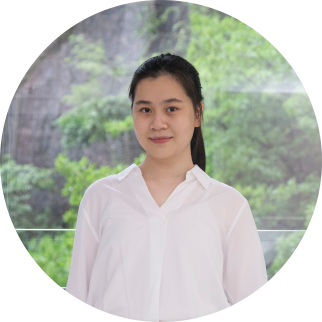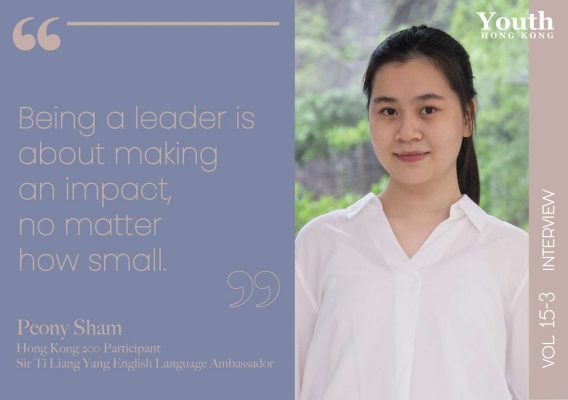//vol.15-3 Our Youth
Small Steps, Big Change
In the dynamic landscape of youth leadership, Hong Kong’s Peony Sham shares her vision of how small actions can reshape communities and inspire an empathetic, adaptable generation.
“Influence,” “world-changing,” “superhero”… These grand words often pop up in our head when talking about leadership. But for a high school student, what does it mean to be a leader?
Peony Sham, a student at Harrow International School Hong Kong and a participant in the HKFYG’s “Hong Kong 200” leadership project, has her own interpretation. To her, being a leader is about “starting small” and making a positive impact on the community.
“It doesn’t necessarily have to be the biggest, greatest, and grandest impact, but by starting small, you can be a leader,” Peony tells Youth Hong Kong. She believes that everyone can become a leader and play a role in making a positive change and becoming a better person. For her, leadership is not a daunting word defined by leading a group and spearheading a project.
“Being a leader is about making an impact, no matter how small.”
Peony, now 17 and in her third year of high school, boasts a list of accomplishments. She is an alumna of ”Hong Kong 200,“ a winner of the HKFYG English Public Speaking Contest, a junior champion in National English Public Speaking Contest 2020, and one of the Sir Ti Liang Yang English Language Ambassadors. As a socially-active teenager, Peony explores how to bring positive change in the realms of mental health, health care and technology.
Peony’s journey of learning, exploring and caring for others began during her secondary school years. She noticed some of her friends were grappling with mental health issues like depression, anxiety, and eating disorders. Determined to make a difference, she joined the school’s wellbeing committee and helped initiate a gratitude tree project, where people could express what they felt grateful for. With the simple idea of bringing small changes in her community, Peony was also involved in other projects aimed at promoting mental health among the elderly and enhancing psychology education.
In 2020, the “Hong Kong 200” leadership project aligned perfectly with Peony’s passion for addressing mental health issues among the elderly. During the height of the Covid pandemic, Peony and her team developed a proposal to provide elderly individuals living alone with virtual reality headsets showcasing old Hong Kong scenes. “I feel more committed to serving my community and Hong Kong after the project.”
While Peony is not alone in her dedication to community service among her peers, the juggle between academic study and volunteer work is not a burden but a stress reliever for her. The experience of interacting with people from all walks of life and gaining insights on their struggles has enriched her life and made her a more empathetic person.
“Through participating in HKFYG programmes, I’ve gained so much more insight, experience and exposure to my community that I wouldn’t have if I only focused on my studies,” says Peony.
“I think studies are important, like math and English. All the basic sciences are important. But to thrive in the future world, focusing on traditional academic studies alone is not enough.”
Living in an era with rapid social transformations and an increasingly connected world, Peony emphasises the significance of technological literacy, communication skills, networking abilities, and the capacity to adapt to a changing environment. “Young people need to be equipped with these skills to face future challenges, because the solutions that have worked in the past that might not necessarily work in the future.”
Having lived through the pandemic and witnessed the rise of AI, Peony is aware of the uncertainty faced by teenagers at her age. To tackle upcoming challenges, she believes that adapting to global developments while pursuing education is essential.
Many young people whom Peony knows are already working on initiatives to bring positive changes, such as volunteering to teach underprivileged children and equipping them with the latest technology, which schools don’t necessarily teach. Instead of focusing only on traditional academic subjects, she suggests that schools and organisations should revamp their curricula to offer better education in 21st-century skills. These skills include knowledge on digital literacy, information source evaluation, and harnessing AI for the benefit of human beings. Peony believes that a small contribution from each sector can collectively lead to a substantial positive change in the future.
As Peony prepares for her A-level exams next year, she aspires to study medicine at university to help the sick and the ill. The idea rises from her childhood experience suffering from eczema. While she may not have a clear picture about what will happen in the future, she’s resolute in making a positive impact within an ever-evolving world.
“If I see a need and identify something that I think I can make a positive contribution to, I will do my best to make a difference.” ■
 Peony Sham, 17, is an alumna of “Hong Kong 200” and a recipient of the AISL Harrow Scholarship. She’s passionate about STEM, public speaking, debating, performing arts and community service.
Peony Sham, 17, is an alumna of “Hong Kong 200” and a recipient of the AISL Harrow Scholarship. She’s passionate about STEM, public speaking, debating, performing arts and community service.


